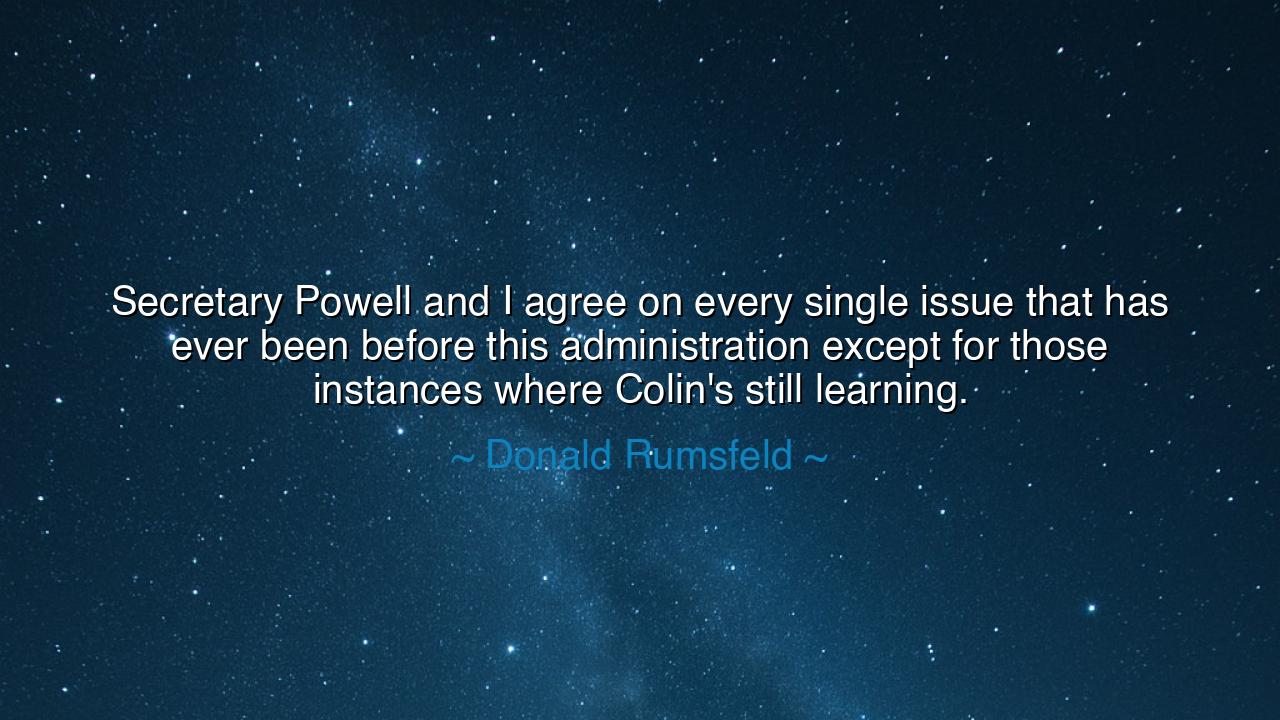
Secretary Powell and I agree on every single issue that has ever
Secretary Powell and I agree on every single issue that has ever been before this administration except for those instances where Colin's still learning.






“Secretary Powell and I agree on every single issue that has ever been before this administration except for those instances where Colin’s still learning.” — Donald Rumsfeld
In this statement, Donald Rumsfeld, the former U.S. Secretary of Defense, cloaks wit within authority and rivalry within diplomacy. At first glance, his words may sound like jest — a political quip meant to amuse or deflect tension. Yet beneath the humor lies a profound commentary on the nature of knowledge, ego, and leadership. In his remark, Rumsfeld positions himself as one who has already learned, while Colin Powell, the Secretary of State, is cast as still a student. But this statement, though playful, carries the sharp edge of power — for in every age and every kingdom, those who lead must wrestle not only with the struggles of war and governance, but with the subtler battles of wisdom, pride, and humility.
The origin of this quote lies in a time of great challenge — the early years of the 21st century, when the United States faced the turmoil of global conflict and the uncertainty of a new world order. Rumsfeld and Powell, two towering figures of American leadership, differed often in philosophy. Rumsfeld favored bold, decisive action — the will of the strategist, unflinching and forward-leaning. Powell, the seasoned soldier and diplomat, believed in caution, in coalition, in reflection before strike. Theirs was not a conflict of enmity, but of perspective — one born of differing lessons learned from their years of service. When Rumsfeld jested that Powell was “still learning,” it was both a defense of his own convictions and a reminder that even the wise may appear naïve to those who see the world through another lens.
To the ancients, such tension between the wise and the wiser was inevitable. In the courts of kings and in the councils of philosophers, the clash of intellects was seen as the crucible of truth. The great Socrates, too, faced accusations of arrogance when he questioned others’ wisdom, yet his probing questions were meant not to belittle, but to awaken thought. In the same way, Rumsfeld’s remark — half iron, half jest — reflects the eternal dance between certainty and inquiry. For what one man calls learning, another calls prudence; what one calls confidence, another sees as pride. This is the paradox of leadership: the belief that one knows enough to lead, yet the humility to know that all leaders are still learning, always.
History offers many such rivalries between equals, where the spark of disagreement led to deeper understanding. Consider Aristotle and Alexander the Great — the philosopher and the conqueror. Aristotle taught Alexander the ways of reason, moderation, and ethics. Yet when the student became ruler, he often ignored his teacher’s counsel, trusting instead his own vision of empire. Aristotle might have thought, as Rumsfeld did, that his pupil was still “learning.” And yet, in his restless ambition and fierce resolve, Alexander changed the world. So too, perhaps, did the friction between Rumsfeld’s boldness and Powell’s restraint forge decisions that shaped their era — not through unity alone, but through the creative fire of disagreement.
Still, the deeper wisdom of Rumsfeld’s statement lies in its unintended irony. For no one — not even the most seasoned general or politician — ever truly finishes learning. To claim otherwise, even in jest, is to flirt with hubris. The wise understand that learning is not a mark of inexperience, but of greatness. Those who “know everything” close the door to wisdom; those who remain students of life keep growing. Thus, the man who truly leads is not the one who stands above others, declaring their ignorance, but the one who listens, learns, and evolves — even amid the clamor of certainty.
Rumsfeld’s quip, then, is both a mirror and a warning. It reminds us that in every field — be it governance, art, or daily life — confidence without humility can harden into blindness. To dismiss another as “still learning” may reveal more about one’s pride than the other’s growth. And yet, there is truth here too: all of us are still learning, and always will be. The wise acknowledge this openly; the proud cloak it in jest.
So let this lesson stand as a torch for those who lead and those who follow. Respect the learners, for they are the builders of tomorrow. And if you hold power, let humility be your armor, for pride has toppled more empires than enemies ever could. Listen to others — even those who disagree with you — for wisdom is found not in uniformity, but in the friction of ideas. Remember always that to lead is to learn, and to learn is to live. For the moment a man declares himself finished with learning, he is not merely mistaken — he is finished altogether.






AAdministratorAdministrator
Welcome, honored guests. Please leave a comment, we will respond soon